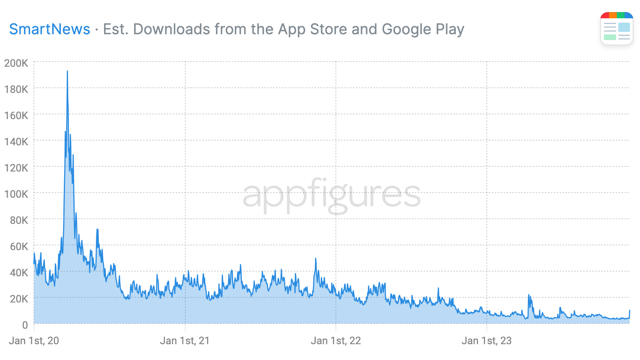
News aggregator app SmartNews had a tough 2023, beginning with widespread layoffs in January and wrapping up with a leadership change that saw co-founder Kaisei Hamamoto assume the role of CEO after the abrupt departure of former CEO Ken Suzuki last month. More alarming, as the landscape continues to shift dramatically, and sometimes unpredictably, for the news industry, the startup’s app is tanking in terms of both downloads and active users, according to recent figures from app intelligence providers Sensor Tower and Appfigures.
Founded in 2012 in Japan, the company arrived in the U.S. in 2014 and expanded its local news footprint in early 2020 to cover thousands of U.S. cities.
At a time when big mobile platforms like Apple and Google were both squaring up to provide their own virtual newsstands for their mobile and tablet users, and social media platforms were making big plays to become news providers themselves to take on some of the advertising and traffic that traditionally was the domain of publishers, SmartNews entered the fray with its own take on the medium: It would source news by partnering with publishers; build algorithms aimed at tailoring more personalized feeds for users; deliver the news in a zippy, AMP-style streamlined format; and sell advertising against its traffic to generate revenue.
The formula paid off with a lot of buzz. It became the first news startup to achieve a billion-dollar valuation since 2015, as Bloomberg reported in 2019, and then in 2021 — a high-water mark for tech funding, as well as for consumers relying more than ever on online channels for news, entertainment, shopping, work and more — its valuation shot up to $2 billion.
But it was not to last: The news app’s numbers have been falling over the past year.
The tides have turned dramatically for news. Some of the most important channels for news traffic — Google Search, social platforms like Facebook — changed how they focus on and surface news links, and that’s had an overall hit on traffic and ad sales. And consumer tastes have changed, too, and it appears that the app is also struggling to attract and retain users.
Over a year ago, the company reportedly had 10 million monthly active users in the U.S., as it began building out an ads sales team under the leadership of a former Google exec.
But per estimates from Appfigures, SmartNews’ daily downloads have dropped by half since January of this year and less than a quarter of the number of daily downloads it had in 2022. The firm’s analysis shows that since 2020, SmartNews has seen a total of roughly 45 million total installs. Given the decline in downloads, Apptopia said a figure of 10 million active users today would now be “a stretch.”

Another firm, Sensor Tower, added more insight, noting that SmartNews had, on average, roughly 1.7 million worldwide daily active users between Q1 2023 and Q3 2023. This represents a “material” decline in users, the firm said, down an average of 28% year-over-year per quarter during this time frame. A former employee for SmartNews also estimated that monthly actives are now likely in the 5 million to 6 million user range, we’re told, which was supported by the third-party data. Sensor Tower’s estimates indicate the SmartNews app has roughly 5 million worldwide monthly active users from Q1–Q3 2023, down an average of 30% year-over-year, per quarter, it said.
SmartNews declined to comment on any of the figures provided by the analytics firms and declined to disclose any numbers itself.
Numbers do tell stories, though. During SmartNews’s hypergrowth period, it raised nearly $500 million in venture funding, per PitchBook data. But notably, its last equity round was back in September 2021, $230 million that valued it at $2 billion. Just this week, PitchBook notes that it raised a debt round closed of just under $70 million.
A recent analysis of what went wrong at SmartNews by news site Rest of World pinned the app’s downturn on Suzuki’s “unconventional leadership.”
Specifically, it described how, in the key market of the U.S., he resisted product updates and was preoccupied more with the U.S. political climate than with audience metrics.
But another aspect of his leadership might have also been about communication. When the company announced that Suzuki was stepping down and handing over the reins to his co-founder Kaisei Hamamoto, it also noted that SmartNews was picking up a new CTO out of the U.S. The company had recruited Cory Ondrejka — a notable veteran of Facebook and Second Life who was working at Google at the time — to join SmartNews. He told TechCrunch that he was recruited directly by Suzuki for the role. Then, on the day he joined, he had no idea that he’d be working with a different CEO.
“It was news to me,” he said in an interview last month with TechCrunch.
Ondrejka admitted he might not have been convinced to jump from Google to SmartNews if it hadn’t been Suzuki doing the recruiting directly — the two had met previously, years before — but insisted things were fine despite that unexpected first-day surprise.
“I’m very happy with where [the company] is right now and where we’re going,” he said. “We have we all have lots of work to do . . . But I feel very supported.” (SmartNews declined a request to interview new CEO Kaisei Hamamoto.)
Sensor Tower also suggested that lapsed product iterations and feature launches likely contributed to falling consumer interest and interaction with the SmartNews app.
For instance, SmartNews’ attempt at launching a more uplifting section to its app, SmartTake, didn’t live up to the task in our early review of the feature this fall, finding that the section still included the kind of stories that would encourage “doomscrolling” — like tales of assassination and murder, a writer’s strike, dementia, and more.
A focus on more positivity is still a windmill that SmartNews is chasing.
“I think that you can’t build a product that leaves people feeling unhappy and angry all the time and then expect to be building something that long term is achieving your goals and frankly aligned with what people need and what the mission of the company is,” Ondrejka said. “Around news, you want people to be able to understand what’s happening in the world. You want to be able to do that in a way that doesn’t leave [users] feeling like they’ve been just hammered by the process.”
He declined to talk about the specifics of what the company’s next steps would be. Yet some of those have been long in coming so far. From what we understand from a source, an overhaul of the app dubbed “Project Atlas” — which had been planned to launch by year-end 2023 — has yet to happen. A spokesperson for the company has said that there will be news coming up in the coming months, which could finally be this launch.
SmartNews’ challenges have had other, more public ramifications. Reviews of the company on Glassdoor have dropped its rating to under 3 stars, with many saying the SmartNews’ future in the U.S. is uncertain, while others complained about how this year’s layoffs were handled.
Those personnel shifts have also impacted working through iterations, too.
“Whenever you have a company that’s going through, delivering something new, alignment is a challenge by itself, even when you have full freedom,” he said. “There are no magic wands to just cause everybody to instantly know what to do.”
Whichever direction SmartNews goes next, it seems that competition will remain tight.
Although some social platforms have moved away from the costly efforts of building and operating news machines, a swarm of Twitter/X alternatives — like Instagram Threads, Mastodon, Bluesky, and others — have been positioning themselves as places to get breaking news. Instagram’s co-founders have also launched a news aggregator app of their own this year with Artifact. The app was nearing 407,000 installs as of earlier this fall, according to data.ai.
And TikTok’s huge pull with younger users especially continues to keep it in the mix for news dissemination. A recent report from Pew found that the number of adults who said they got their news from ByteDance’s user-generated video app moved up to 14% from just 3% in 2020.
Other apps, including Flipboard and Substack, have launched features of their own to improve news discovery and conversation, including Flipboard’s editorial desks for the fediverse and Substack’s Twitter-like Notes. The latter also redesigned its app in September to boost discovery and engagement.
One area that seems to be up for discussion is whether “news” will be the only thing longer term that SmartNews will aggregate.
“Aggregation is this delightfully broad word that has picked up a very specific set of set of definitions, based on what we’ve seen over the last decade,” Ondrejka said. “For this notion of delivering quality information, aggregation is a perfectly good word to describe that. [But] I would be pretty surprised if the product we are shipping at some period of time in the future is exactly the product you’re seeing now because the reality is the opportunity. As technology changes — and what makes technological changes so both exciting and sometimes terrifying — what people’s expectations are change. What’s valuable to them changes. And can you combine that [with your] vision? I think there’s a path through here. [Users] are going to tell us something every moment along the way. I think our category will probably continue to be aggregation because it’s a good word.”



